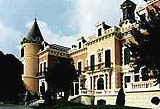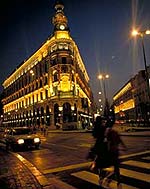 |
| Palau de Les Heures, Barcelona, Spain |
In a privileged position on the northeastern coast of the Iberian peninsula and the shores of the Mediterranean1, Barcelona is the second largest city in Spain in both size and population. It is also the capital of Catalonia, an Autonomous2 Community within Spain. There are two official languages spoken in Barcelona: Catalan, generally spoken in all of Catalonia, and Castillian Spanish. The city of Barcelona has a population of 1.510.000, but this number spirals (不断上升)to more than 4.000.000 if the outlying areas are also included.
 The capital of Catalonia is unequivocally a Mediterranean city, not only because of its geographic3 location but also and above all because of its history, tradition and cultural influences. The documented history of the city dates back to the founding of a Roman colony on its soil in the second century B.C. Modern Barcelona experienced spectacular growth and economic revival4 at the onset5 of industrialization during the second half of the 19th century. The 1888 World's Fair became a symbol of the capacity for hard work and the international outlook projected for the city. Culture and the arts flourished in Barcelona and in all of Catalonia; the splendor6 achieved by Catalonian modernism is one of the most patent displays. The capital of Catalonia is unequivocally a Mediterranean city, not only because of its geographic3 location but also and above all because of its history, tradition and cultural influences. The documented history of the city dates back to the founding of a Roman colony on its soil in the second century B.C. Modern Barcelona experienced spectacular growth and economic revival4 at the onset5 of industrialization during the second half of the 19th century. The 1888 World's Fair became a symbol of the capacity for hard work and the international outlook projected for the city. Culture and the arts flourished in Barcelona and in all of Catalonia; the splendor6 achieved by Catalonian modernism is one of the most patent displays.
Barcelona, more than just a single city, is really a collection of multi-faceted and diverse cities. The visitor unfamiliar7 with its history might be surprised by the fact that such a modern and enterprising city preserves its historic Gothic center almost intact, or by the curious contrast between the maze8 of narrow streets and the grid-like layout of the Eixample, the urban planning "Enlargement" project of the end of the 19th century; or that beside a modern high-rise, we can also find a quaint9 square where the most outstanding decorative10 element is a chimney, an echo of the old factories that were installed there in the past.
|
 收听单词发音
收听单词发音 
